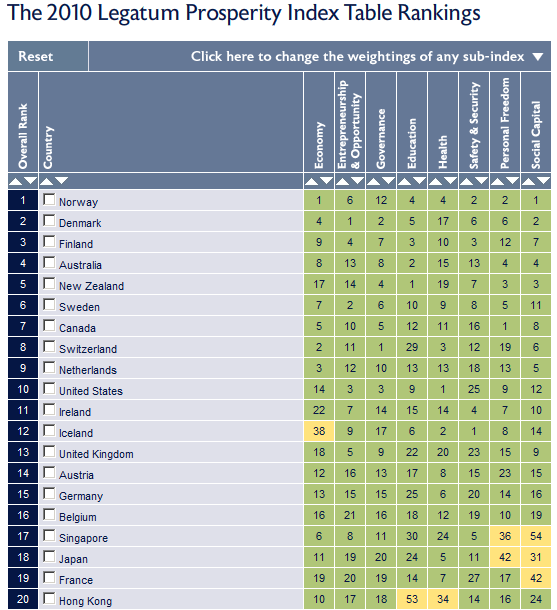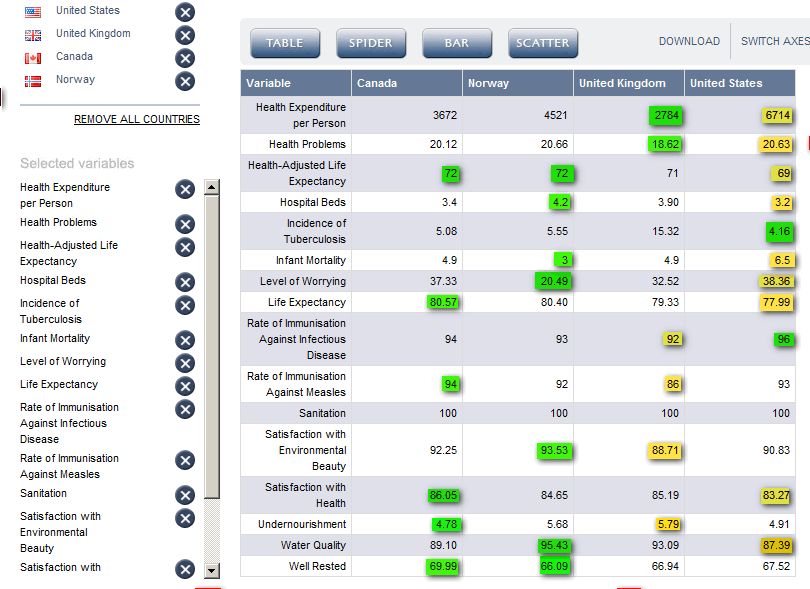The Legatum Institute has a website devoted to measuring the World’s Prosperity and showing the comparison among all the World’s countries. Being a strong believer in unbiased measures as a way to steer a group or country to enlightened betterment, ye Editor was immediately attracted to the Prosperity.com website. To move out of the OECD [just the economically developed countries] or CIA Factbook domain of comparative national statistics this a ppears to be a site worthy of investigating in more detail.
The Legatum Institute is an offspring of the Sovereign Fund which has its origins in New Zeeland. The Fund has been on the fore fromt of investment in emerging markets like Brazil, Russia, South Korea, and India among others. The Fund is now based in Dubai; the Legatum Institute is in London England. One can see the logical interest of the Fund in the studies and analysis done by the Institute – know where to invest is keyed as much on the social and economic health of the business – and the health of its major markets. So the rankings of countries by Legatum would naturally be of interest to the Fund and readers.
It is not a surprise that the Scandinavian and former British Empire countries dominate the standings. If one looks at the criteria by which countries are evaluated below there is a certain logic to the rankings.
- Economy – Stable and growing economies increase per capita income and promote the overall wellbeing of its citizens.
- Entrepreneurship & Opportunity (E&O) – A strong entrepreneurial climate in which citizens can pursue new ideas and opportunities for improving their lives leads to higher levels of income and wellbeing.
- Governance – Well-governed societies enjoy national economic growth and citizen wellbeing.
- Education – Education is a building block for prosperous societies.
- Health – A strong healthcare infrastructure in which citizens are able to enjoy good physical and mental health leads to higher levels of income and wellbeing.
- Safety & Security – Societies plagued by threats to national security and personal safety cannot foster growth in average levels of income or wellbeing.
- Personal Freedom – When citizens enjoy their rights to expression, belief, organisation, and personal autonomy in a society welcoming of diversity, their country enjoys higher levels of income and social wellbeing.
- Social Capital – Social networks and the cohesion that a society experiences when people trust one another have a direct effect on the prosperity of a country.
Now readers should click on each of the main heading to see what sub-factors are used to generate the eight major Prosperity rankings. These individual factors will be examined in detail in further posts on the Prosperity Index. But to give readers an idea of how perilous an endeavor the Legatum Institute has taken , ye Editor would draw your attention to the fact that the US is ranked number 1 in the World in Health. If you look at the major sub-factors that make up the Health measure, the following chart is produced:
Now one could debate these health sub-factors and how well they measure the efficacy of the overall Health measure. Also the way these subfactors are combined in two Income and Well-being regresssions are not explained. But the ranking of the US as number 1 in Health, and by a wide margin over Iceland, Switzerland, Japan, and Norway is hard to fathom. There are some that would have serious questions about US healthcare. As can be seen in the comparative table above, the US is tops in only two health sub-factors both dealing with immunizations. But the US is worst in nine of the sub-factors including nearly double the per capita health costs [and those have gotten 10-20% worse in recent weeks], lowest beds per capita, highest infant mortality, and lowest life expectancy [on both scales]. Hmmm.
Now to their credit, the Legatum Institute a)encourages readers to examine the data and b)also encourage readers to change the weighting of the factors for the country rankings. But it is not clear how the Legatum Institute a)choose the sub-factors to measure the key determinant afctors like Health and b) how do they explicitly use the sub-factors to compute major factors like Health and Economy.In effect, the apparent miss on Health brings the other major factors into question. In sum, this appears to be a potential blot/blight on what is essentially a welcome exercise.


